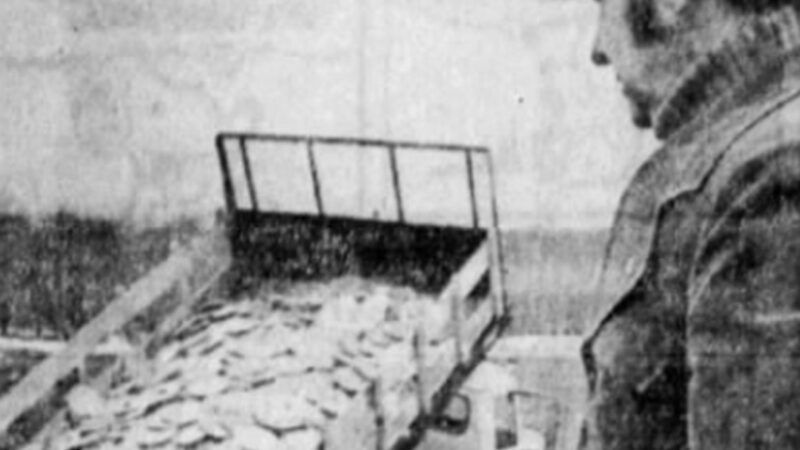Remembering the Great Pizza Funeral of 1973
Fifty years ago, dozens of people gathered in Ossineke, Michigan, for one of the strangest funerals in American history

Fifty years ago this March, dozens of people gathered in Ossineke, Michigan, for one of the strangest funerals in American history. They were there to witness the burial of nearly 30,000 frozen pizzas that the Food and Drug Administration (FDA) had deemed inedible. The pizzas actually were just fine.
At the center of the "Great Pizza Funeral" was Mario Fabbrini, an Italian immigrant who founded Papa Fabbrini Pizzas after settling in Michigan. In February 1973, Fabbrini heard from officials at the FDA, which was issuing a widespread recall of canned mushrooms after a suspected outbreak of botulism at a canning facility in Ohio. Fabbrini submitted samples of his pizzas to the FDA for testing. When two mice died after eating his pizza samples, Fabbrini was ordered to recall thousands of pies.
The "funeral" on March 5, 1973, was how Fabbrini disposed of the potentially tainted pizzas. Trucks dumped the pies into a massive ditch at a Michigan farm. It was partly a cheesy public relations stunt. The Associated Press covered it, and the funeral made the front page of the Detroit Free Press. It was also a public show of accountability during a botulism scare: Better to lose 30,000 pizzas than to lose customers for years to come.
The funeral might have seemed like a jab at the FDA for mandating the recall in the first place. In the weeks leading up to the funeral, as Fabbrini was rounding up thousands of mushroom-topped pizzas from stores and homes across Michigan, the FDA realized it had made a mistake. The lab mice that had been fed Fabbrini's pizza died of an unrelated infection, not from botulism.
"I think it was indigestion," Fabbrini quipped to an A.P. reporter on the day of the funeral. "Maybe they just didn't like my pizzas."
But having already gone ahead with the recall, Fabbrini was left with little choice but to destroy the pizzas. Hence the funeral, where he cooked other pizzas for hundreds of people, including then-Gov. William Milliken, who came out to witness the weird moment. After the pizzas were buried and the governor said a few words over the grave, Fabbrini reportedly marked the tomb with a garland of red gladioli and white carnations—the colors of pizza sauce and mozzarella cheese.
According to the A.P., a reporter asked Fabbrini about the safety of the pizza he was serving. "Gov. Milliken ate a piece," he replied, "and he's still alive."
The recalled and destroyed pizzas cost Fabbrini $60,000 in lost retail sales, according to a lawsuit that he subsequently filed against his mushroom suppliers. United Canning, the main defendant in the lawsuit, used the fact that the FDA had screwed up the initial diagnosis to argue that Fabbrini had never demonstrated any defect in their products and had voluntarily recalled his pizzas.
The recall, of course, was voluntary in name only. As the Michigan Appeals Court pointed out in its final ruling in the case, "FDA representatives threatened to inform Fabbrini's customers to put the pizzas aside" and "radio stations were advising the public" that Papa Fabbrini Pizzas were potentially unsafe to eat. Faced with those direct threats to the survival of his business, the court's three-judge panel ruled, Fabbrini had no choice but to recall the pizzas. The judges affirmed the $211,000 settlement that a jury awarded Fabbrini.
The FDA, meanwhile, never had to pay anything. And Fabbrini's once-growing frozen pizza business faded away. He sold the remaining assets in the early 1980s.
Botulism is no joke, and Fabbrini probably was right to quickly recall the pizzas rather than risk causing any real funerals. But 50 years after his pies were buried in the dirt of a Michigan farm, the Great Pizza Funeral serves as a reminder that public health officials' mistakes can come with heavy costs.

Show Comments (43)